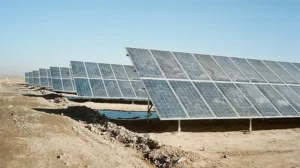Ever pondered why solar panels avoid their cleaning routines during daylight hours? It’s a question that sparks intrigue and uncovers a fascinating tale of innovation and practicality. As society embraces renewable energy, understanding the nuances of solar panel maintenance becomes crucial. In this article, we delve into the mysteries of nocturnal solar panel cleaning, unveiling groundbreaking solutions like Taypro’s autonomous waterless robots, transforming the industry with efficiency and eco-consciousness.
The Perils of Cleaning Solar Panels in Full Swing
Reduced Efficiency and Output
One of the most apparent drawbacks of cleaning solar panels during peak daytime operation is the inevitable disruption to their efficiency and output. Solar panels work by converting sunlight into electricity, and any interference with this process can lead to decreased performance. Cleaning during sunlight hours means temporarily disabling sections of the panel array, causing an immediate drop in energy production. This reduction in output translates to lost potential revenue for solar power owners and could significantly impact overall energy goals.
Potential Damage to Panels
Cleaning solar panels with water during peak daytime operation poses the additional risk of thermal shock, especially when the panels are subjected to high temperatures. Solar panels can reach elevated temperatures during operation, particularly in sunny climates or during summer months. Introducing cold water onto hot panels can create sudden temperature differentials, causing thermal stress and potential damage to the glass or other components.
The rapid contraction or expansion of materials due to temperature fluctuations may lead to micro-cracks or structural weaknesses, compromising the integrity of the panels over time. While tempered glass is commonly used in solar panel manufacturing to enhance durability, it is not immune to thermal shock and may succumb to gradual degradation if subjected to repeated thermal stress.
To mitigate the risk of thermal shock, it is advisable to avoid cleaning solar panels with cold water during peak sunlight hours. Instead, opt for cleaning solutions that evaporate quickly or consider scheduling maintenance during cooler times of the day to minimize temperature differentials. By taking proactive measures to prevent thermal shock, solar power stakeholders can safeguard their investments and ensure the long-term reliability of their energy systems.
Safety Concerns for Maintenance Personnel
Cleaning solar panels atop roofs or in expansive solar farms poses inherent safety risks for maintenance personnel, which are exacerbated when performed during daylight hours. The combination of height, potential electrical hazards, and exposure to intense sunlight increases the likelihood of accidents or injuries. Moreover, the glare from sunlight can impair visibility, making it challenging to detect hazards or navigate precarious terrain safely. These safety concerns underscore the importance of implementing proper protocols and precautions when conducting maintenance activities on solar panel installations.
Alternatives and Solutions
Optimal Timing for Cleaning
To mitigate drawbacks, consider scheduling maintenance during early morning or late afternoon when sunlight intensity is lower. This preserves electricity generation while ensuring cleanliness. Cooler temperatures minimize thermal shock when applying water or cleaning solutions, maintaining panel integrity.
Utilization of Autonomous Waterless Robots
Innovations like Taypro’s autonomous waterless robots offer a solution. Equipped with advanced technology, they operate during nighttime hours without water, ensuring panels remain pristine without disrupting daytime electricity generation. These robots revolutionize maintenance efficiency and safety, reducing environmental impact.
Regular Monitoring and Maintenance
Proactive monitoring and maintenance mitigate performance issues. Implementing a comprehensive inspection schedule identifies potential problems early. Routine cleaning during off-peak hours prevents debris accumulation, ensuring optimal panel efficiency. Predictive analytics and remote monitoring technologies enhance system reliability and longevity.
FAQs
Can solar panels be cleaned while generating electricity?
Yes, but risks include reduced efficiency, potential damage, and safety hazards for personnel.
Why avoid cleaning solar panels during the day?
Cleaning at night avoids disrupting daytime electricity generation and minimizes safety risks.
What are the benefits of Taypro’s autonomous robots?
Taypro’s robots clean efficiently without water, ensuring panel cleanliness without disrupting operations.
The mystery of why solar panels avoid daytime cleaning unravels with practical solutions and innovations. By embracing optimal timing, autonomous technology like Taypro’s robots, and regular maintenance, stakeholders ensure efficient, safe, and sustainable solar energy generation. Let’s illuminate the path towards a brighter, cleaner future!





